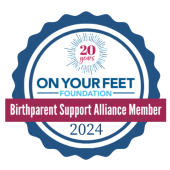Considering Single Parent Adoption? 9 Things You Should Know

In recent years, there’s been a notable increase in single-parent adoption. In fact, more than a quarter of children adopted from foster care were welcomed into the homes of single adopters in the Federal fiscal year 2017, with almost 15,000 single women and nearly 2,000 single men making the life-changing decision to adopt.
Societal perceptions are shifting, recognizing the capability of single individuals to provide loving, stable homes for children in need. This change is mirrored in the policies of many adoption agencies, which now welcome single-parent applicants with open arms.
Here at the Adoption Center for Family Building, we understand that the decision to pursue single-parent adoption is a deeply personal one. That’s why we’re here to provide you with the information and support you need to tackle this process with confidence.
What to Know When Considering Single-Parent Adoption
Adopting as a single parent brings its own set of challenges and rewards. Here are 8 important points to keep in mind when considering single-parent adoption:
1. Understanding Your Rights
Navigating the legal aspects of adoption can feel overwhelming, especially for single individuals. It’s essential to familiarize yourself with the laws and regulations governing adoption in your area, as they can vary significantly from one jurisdiction to another.
In many places, single individuals have the same rights and opportunities as couples when it comes to adopting a child. However, it’s vital to seek legal guidance to ensure you understand your rights and responsibilities throughout the process.
2. Building Your Support Network
Single parenthood can be both rewarding and challenging, and having a strong support network in place is invaluable. Reach out to friends, family members, and other single parents who can offer guidance, encouragement, and practical assistance along the way. Joining support groups or online communities for single parents can also provide a sense of camaraderie and connection, reminding you that you’re not alone in this journey.
3. Financial Considerations
Parenthood, whether as a single parent or part of a couple, comes with significant financial responsibilities. Before pursuing single-parent adoption, take the time to assess your financial situation carefully. Consider the costs associated with the adoption process itself, as well as the ongoing expenses of raising a child.
Developing a comprehensive budget and exploring potential sources of financial support can help alleviate some of the stress associated with the financial aspect of parenthood.
4. Exploring Different Adoption Paths
When it comes to single-parent adoption, there are various paths you can explore. Options include domestic adoption, international adoption, foster care adoption, and even embryo adoption. Each option has its own unique considerations and requirements.
Take the time to research and explore different adoption paths to determine which one aligns best with your preferences, circumstances, and values. Consulting with adoption professionals can also provide valuable insight and guidance as you weigh your options.
5. Understanding the Adoption Process
The adoption process can be complex, covering everything from paperwork and background checks to home studies and waiting periods. Here is a general overview to give you an idea of what to expect, though keep in mind that the process may vary depending on your specific situation and location:
- Research and Decision Making: Begin by researching different types of adoption, including domestic, international, and foster care adoptions. Consider your own circumstances, preferences, and the needs of children available for adoption to make an informed decision about which path is right for you.
- Selecting an Agency or Attorney: Choose an adoption agency or attorney that has experience with single-parent adoptions and is supportive of your decisions and preferences. They will be your main source of information, support, and guidance throughout the process.
- Completing the Home Study: The home study is a critical part of the adoption process, assessing your suitability as a parent. It includes interviews, home visits, background checks, and gathering of documents. Prepare to be open and honest during this process.
- Waiting and Matching: After approval, you’ll enter a waiting period until you match with an expectant parent. This can vary greatly in length depending on various factors, including the type of adoption you’re pursuing and your openness to different child profiles.
- Finalization and Post-Adoption Support: Once a child is placed with you, there will be a supervisory period before the adoption can be legally finalized in court. After finalization, it’s important to seek out post-adoption resources and support to help both you and your child navigate the transition successfully.
The adoption process can be complex, requiring everything from paperwork and background checks to home studies and waiting periods. As a single prospective parent, it’s essential to familiarize yourself with the various stages of the adoption process and the role you’ll play at each step. Working with an experienced adoption agency or attorney can streamline the process and provide you with the support and guidance you need to get through it successfully.
6. Preparing for Home Study
A key element in the adoption process is the home study. This comprehensive evaluation assesses the suitability of the prospective parent’s living environment, lifestyle, and readiness to adopt. For single parents and couples, preparing for the home study involves ensuring their home meets safety standards, demonstrating financial stability, and showcasing an emotionally supportive environment. It’s also a time for introspection, to reaffirm one’s commitment and readiness to handle the responsibilities of parenthood.
7. Nurturing Your Child’s Well-Being
As a single parent, prioritizing your child’s well-being is crucial to their emotional and psychological development. Creating a nurturing and supportive environment where your child feels loved, valued, and secure is important. You’ll also want to encourage open communication, foster healthy relationships, and provide opportunities for growth and development. Remember that parenting requires constant learning and adaptation, and being attuned to your child’s needs and emotions will strengthen your bond and enhance their overall well-being.
8. Addressing Challenges and Overcoming Obstacles
Like any parenting path, single parent adoption may present its fair share of challenges along the way. From logistical hurdles to emotional struggles, it’s essential to approach these challenges with resilience, patience, and a willingness to seek support when needed. Remember that it’s okay to ask for help and lean on your support network during difficult times. By addressing challenges head-on and persevering through adversity, you’ll emerge stronger and more resilient as a parent.
Taking the Next Steps Toward Single-Parent Adoption
Single-parent adoption is a courageous and deeply rewarding journey that opens the door to parenthood for individuals of all backgrounds and circumstances. If you’re considering single-parent adoption, we’re here to support you every step of the way. Visit the Adoption Center for Family Building website to learn more about our services and how we can help you build the family of your dreams. You can also contact us directly to speak with one of our experienced adoption professionals and get started on your adoption journey today.





